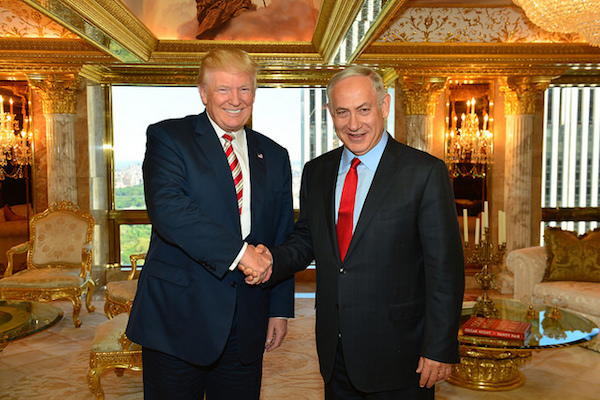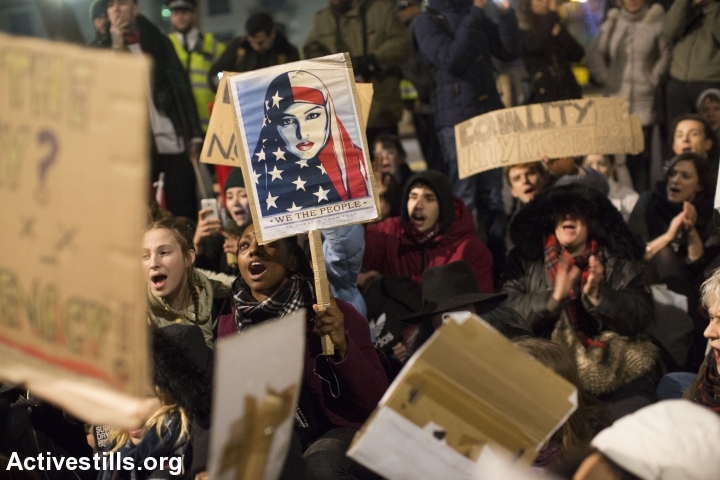Both the American and Israeli governments reek of paranoia, fear, and desperation. The struggle against them must begin with the knowledge that we are opposing a desperate and fearful group.

By all accounts, the new administration in the U.S., and the veteran one in Israel should be relaxing and enjoying the heights of power they have attained. Both are facing a weakened opposition while tightening their control on the executive, legislative, and judicial branches in their respective countries. They have done so in the face of frequent predictions of their impending demise, while making few concessions to their critics.
In a certain sense, that appears to be exactly what they are doing — implementing an unapologetically xenophobic agenda in foreign and domestic policy arenas. But if you listen to the tone that characterizes their conduct, a different impression emerges. Both the U.S. and Israeli administrations seem prickly and sensitive, easily rattled by any challenge, overreacting to even the smallest slight.
To some extent, this reflects the character of the leaders in question, more so with Trump who is a truly unusual president, than with Israel’s Netanyahu, who is more of a conventional politician. Yet leaders reflect the political systems that give them power, and rely on the cooperation and consent of many other actors.
This is clearly on display when the Jerusalem municipality attempts to shut down public facilities that provide a platform for dissidents; or when the Senate majority leader hypocritically uses arcane rules to shut down a woman senator’s condemnation of one of Trump’s nominees. Neither of these incidents, at least as far as we know, had anything to do with the American president or Israeli prime minister. What they do have in common, along with many other actions taken by these two administrations and their allies, is their counter-productive effect from a purely instrumental perspective.
By acting in a highly visible and clumsy way to shut down opposition, the ruling parties in both countries are giving far more platform and stature to that opposition than it would otherwise enjoy. And they are not just ham-handed — they are also sloppy and disorganized. This was evident with both Trump’s executive order banning nationals of seven predominantly Muslim countries from entering the United States, and the new Israeli law retroactively legalizing the theft of privately-owned Palestinian land in the West Bank. Both of these policy moves were crafted in a manner sure to maximize international condemnation and invite robust legal challenge, despite the existence of many effective alternatives.

Some see this flailing as masking an evil genius, an attempt to intentionally provoke opponents and create politically advantageous high-profile confrontations. I seriously doubt that. Just look at the processes that led to Trump’s executive order and Israel’s law. The fractiousness and disorder within the governing coalitions that produced these moves are not really indicative of clever design or intentional deviousness.
Instead, the American and Israeli governments reek of paranoia, fear, even desperation. It is evident not just in their operations and actions, but in their manner and style. Over-the-top aggression, easily disproven lies, and a generally irate tone characterizes almost every public statement. This is the opposite of the optimism, confidence, and cool resolve you would expect from factions that have managed to amass such great power.
Here the difference between the two cases only magnifies the puzzle. Netanyahu is genuinely in danger right now, due to spiraling corruption investigations against him. But some of the worst flailing seems to come from other actors in the Israeli system, at times in response to Netanyahu’s objections (the land grab law is one such example). Trump, on the other hand, is clearly the focal point of chaos and incompetence in his administration. However, as a newly-elected president, with majorities in Congress and soon the judiciary, there appears to be little to justify the levels of panic and confusion that often emanate from him and his allies.

The most important clue to solve this puzzle is Trump and Netanyahu’s obsession with attacking, controlling and manipulating the news media (indeed, this is one of the major sources of Netanyahu’s recent legal troubles). Admittedly, even within their own camps, they are extreme outliers in terms of crudity and relentlessness on this issue — something that surely has to do with their individual psychological makeup. But they are also emblematic of a broader approach on the right, which has fueled the rise of rigorously partisan and uncurious media organs such as Israel Hayom in Israel and Fox News in the U.S.
Journalists are a major problem for the Israeli and American extreme right because, despite all their flaws, they occasionally do provide information and cover actual events. In other words, they reflect reality — however partially and inadequately.
Reality is the greatest foe of the extreme right wingers currently in power. In the real world, Palestinians, Mexicans, Muslims, and many other groups that they do not like continue to exist, despite travel bans and land grabs. In the real world, international relations are crucial for the prosperity of both countries and cannot be flippantly dismissed. “Alternative facts” are easily malleable. Actual facts cannot be so flexibly managed. The extreme right is not creating “facts on the ground,” it is being undone by them, bit by bit.
Netanyahu, Trump, and their allies are fighting a losing battle. Deep inside, they know this. If they truly believed otherwise, their disposition would be sunny and confident, not dark and fretful.
This is not cause for complacency. Part of the reason these agendas will be defeated is precisely because people are not complacent — they are mobilized and agitated (at least in the U.S.; this kind of mass opposition seems to be further down the road in Israel and Palestine). Until they are stopped, Trump and Netanyahu can do great harm, some of which will be irreparable. Nonetheless, the struggle against them must begin with the insight that we are not fighting an ascendant and secure power, we are opposing a desperate and fearful faction.

